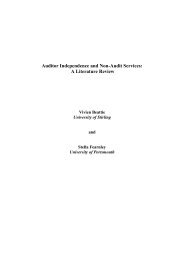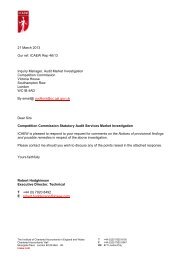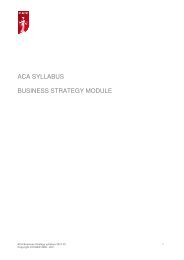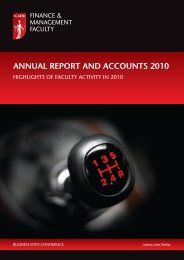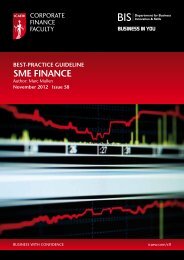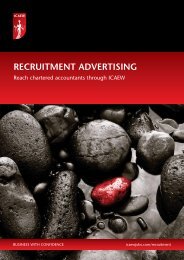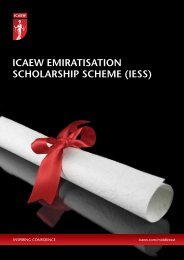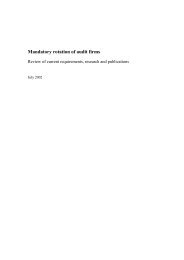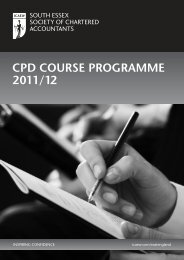Panel 6.3: Weisbrod’s <strong>public</strong> <strong>in</strong>terest ratioWeisbrod’s ‘<strong>public</strong> <strong>in</strong>terest ratio’ sought to measure <strong>the</strong> effect of lobby groups’ benefit. Theratio is calculated as external benefit divided by external plus <strong>in</strong>ternal benefit. 126 For example,at one extreme, a labour union <strong>in</strong> a ‘closed shop’ factory campaign<strong>in</strong>g to improve safetyissues <strong>in</strong> that factory, would have a very low ratio – <strong>the</strong>re is no external benefit, only benefitto its members. A small rambl<strong>in</strong>g group campaign<strong>in</strong>g to re-open a pedestrian bridge thatwas used by many o<strong>the</strong>rs, would, if successful, be likely to benefit mostly people outside itsown group, so, based on numbers affected, <strong>the</strong>re would be a small <strong>in</strong>ternal benefit but a muchlarger external benefit. However, Weisbrod’s ratio does not allow <strong>for</strong> <strong>the</strong> size of <strong>the</strong> groupconcerned: it actually tends to flatter small groups. It also does not take <strong>in</strong>to account anyqualitative factors attributable to <strong>the</strong> respective group<strong>in</strong>gs, so should be treated with caution.Ano<strong>the</strong>r matter to address is to ensure that <strong>the</strong> selection of op<strong>in</strong>ion sought is not biased,consciously or o<strong>the</strong>rwise, towards those groups or <strong>in</strong>dividuals most likely to agree with <strong>the</strong><strong>in</strong>tentions of <strong>the</strong> advocate of <strong>the</strong> <strong>public</strong> <strong>in</strong>terest action. As noted previously, <strong>public</strong> choice<strong>the</strong>ory suggests that those responsible <strong>for</strong> <strong>public</strong> <strong>in</strong>terest actions may well have <strong>the</strong>ir ownmotivations, and a pre-determ<strong>in</strong>ed idea of what <strong>the</strong>y would like <strong>the</strong> outcome to be.Panel 6.4: <strong>ICAEW</strong> and ascerta<strong>in</strong><strong>in</strong>g relevant op<strong>in</strong>ionIn <strong>the</strong> context of <strong>in</strong>dividual members, expectations of those with a direct <strong>in</strong>terest are usuallymade relatively clear by <strong>the</strong> client or employer. The potential problem is with potentialconflicts between <strong>the</strong>se duties, and wider duties to <strong>the</strong> general <strong>public</strong>, considered <strong>in</strong>Panels 3.1 and 4.1.For <strong>ICAEW</strong>, <strong>in</strong> common with o<strong>the</strong>r regulatory and/or representational bodies, ascerta<strong>in</strong><strong>in</strong>gand weight<strong>in</strong>g appropriate op<strong>in</strong>ion, as opposed to just expressed op<strong>in</strong>ion is a challenge.Consultation has to be not just reactive to those best organised to lobby, but, us<strong>in</strong>gexist<strong>in</strong>g knowledge and skills, proactive <strong>in</strong> terms of seek<strong>in</strong>g out o<strong>the</strong>rs likely to be affected,<strong>in</strong> particular where gaps exist <strong>in</strong> <strong>the</strong> knowledge and skills. <strong>ICAEW</strong> does this through <strong>for</strong>example: try<strong>in</strong>g to collect and balance out <strong>in</strong>put from its committees and boards; <strong>public</strong>is<strong>in</strong>gactivities; organis<strong>in</strong>g events <strong>for</strong> those likely to have an <strong>in</strong>terest; and <strong>in</strong>itiat<strong>in</strong>g direct contactswith its members and o<strong>the</strong>r relevant persons.<strong>ICAEW</strong>’s Code of Ethics <strong>in</strong>cludes a requirement to ma<strong>in</strong>ta<strong>in</strong> confidentiality as a fundamentalpr<strong>in</strong>ciple. However it allows this to be over-ridden <strong>in</strong> a number of circumstances, <strong>in</strong>clud<strong>in</strong>gwhen disclosure is <strong>in</strong> <strong>the</strong> <strong>public</strong> <strong>in</strong>terest. However, it recognises <strong>the</strong> potential differencesbetween actual and expressed <strong>in</strong><strong>for</strong>mation, counsell<strong>in</strong>g that ‘In decid<strong>in</strong>g whe<strong>the</strong>r to discloseconfidential <strong>in</strong><strong>for</strong>mation, relevant factors to consider <strong>in</strong>clude ... whe<strong>the</strong>r all <strong>the</strong> relevant<strong>in</strong><strong>for</strong>mation is known and substantiated, to <strong>the</strong> extent it is practicable. When <strong>the</strong> situation<strong>in</strong>volves unsubstantiated facts, <strong>in</strong>complete <strong>in</strong><strong>for</strong>mation or unsubstantiated conclusions,professional judgement shall be used...’ 1276.5 Ensur<strong>in</strong>g conflicts with<strong>in</strong> <strong>the</strong> relevant <strong>public</strong> are not overlookedThe ‘consensualist’ approach referred to earlier could be taken as suggest<strong>in</strong>g that someth<strong>in</strong>gcan only be <strong>in</strong> <strong>the</strong> <strong>public</strong> <strong>in</strong>terest if everyone agrees with it – what has also been called acollective concept of <strong>the</strong> <strong>public</strong> <strong>in</strong>terest. 128 However, we believe that this is too narrow aperspective and would discount many actions which are <strong>for</strong> <strong>the</strong> greater good, even though noteveryone agrees with <strong>the</strong>m. There are <strong>in</strong>evitably variations between what different <strong>in</strong>dividualswant, both <strong>in</strong> terms of <strong>the</strong>ir underly<strong>in</strong>g moral values and, <strong>in</strong> priorities between values because<strong>the</strong>y often conflict with each o<strong>the</strong>r. For example, whe<strong>the</strong>r <strong>the</strong> end justifies <strong>the</strong> means, or<strong>the</strong> means justifies <strong>the</strong> end. A fur<strong>the</strong>r source of differences is <strong>the</strong> variation <strong>in</strong> cultural values,particularly, though not exclusively, across <strong>in</strong>ternational boundaries.126Quoted <strong>in</strong> Pleasence and Maclean, The Public Interest.127<strong>ICAEW</strong>, Code of Ethics.128Benditt, ‘The Public Interest’.42The relevant <strong>public</strong>’s wants
Panel 6.5: Eastern and Western philosophiesThere is a considerable amount of literature focus<strong>in</strong>g on <strong>the</strong> differences between western andCh<strong>in</strong>ese philosophy. The latter is often equated with Confucianism, although this is just oneelement of Ch<strong>in</strong>ese philosophy. There are a number of o<strong>the</strong>r philosophies which blend <strong>in</strong>to<strong>the</strong> whole, deriv<strong>in</strong>g from <strong>the</strong> ‘Hundred Schools of Thought’ period. These <strong>in</strong>clude <strong>for</strong> example:• Mohism, which is similar to democratic centralism <strong>in</strong> that leaders embody and en<strong>for</strong>ce aconsensus moral judgement;• daoism, which tends more towards <strong>the</strong> value of utility but is pluralist ra<strong>the</strong>r than<strong>in</strong>dividualist, so societies make <strong>the</strong> choice; and• Xunxi, a version of Confucianism, which <strong>in</strong>ter alia advocated suppress<strong>in</strong>g rival voices <strong>in</strong><strong>the</strong> <strong>in</strong>terests of social order and economic distribution. 129For our purposes <strong>the</strong> issues can be illustrated and considered concentrat<strong>in</strong>g on Confucianism.Western philosophers tend to focus on <strong>the</strong> <strong>in</strong>dividual as an autonomous and rational be<strong>in</strong>g.This follows Greek philosophy which requires reason<strong>in</strong>g and <strong>analysis</strong>, but also <strong>in</strong>corporatesnotions from Christianity such as <strong>in</strong>dividual souls and an <strong>in</strong>dividual quest <strong>for</strong> salvation.Confucianism focuses on harmonious relationships <strong>in</strong> which reciprocity and obligations to<strong>in</strong>dividuals or groups take precedence over <strong>in</strong>dividual rights or obligations to a wider abstractnotion of <strong>the</strong> <strong>public</strong> good. Examples of differences of view on certa<strong>in</strong> actions that this mightresult <strong>in</strong> <strong>in</strong>clude: payments to smooth th<strong>in</strong>gs out; nepotism; employer loyalty; gift giv<strong>in</strong>g;personal relationships; <strong>in</strong>vestments <strong>in</strong> related firms; and profit versus stability. 130It has been suggested that arguments <strong>for</strong> human rights will not work with<strong>in</strong> a Ch<strong>in</strong>ese moralconceptual<strong>framework</strong>. Western rationalism requires recognition of different po<strong>in</strong>ts of viewprovided <strong>the</strong>y are seriously reflective. The Ch<strong>in</strong>ese character <strong>for</strong> ‘rights’, used on its own,does not have <strong>the</strong> western sense of human rights: it implies power. 131In consider<strong>in</strong>g how to determ<strong>in</strong>e op<strong>in</strong>ion, <strong>the</strong> likely impact of <strong>the</strong> decision across cultural ando<strong>the</strong>r boundaries needs to be considered by <strong>the</strong> advocate of a <strong>public</strong> <strong>in</strong>terest action. If <strong>the</strong>re isfeedback miss<strong>in</strong>g from sections of <strong>the</strong> relevant <strong>public</strong> that are likely to take a different view, <strong>the</strong>decision itself will be open to challenge unless reasonable ef<strong>for</strong>ts have been made to fill <strong>the</strong> gap.6.6 Theoretical approach to assess<strong>in</strong>g wantsIt is useful to consider what steps have been taken to determ<strong>in</strong>e what <strong>the</strong> relevant <strong>public</strong> wants.Sometimes it is not possible to establish what people want with any reasonable degree ofcerta<strong>in</strong>ty. An option is to establish a <strong>the</strong>oretical approach by ‘stand<strong>in</strong>g <strong>in</strong> <strong>the</strong>ir shoes’ – a use of<strong>the</strong> ‘veil of ignorance’ concept referred to fur<strong>the</strong>r <strong>in</strong> Section 7.4.1, although <strong>the</strong> latter is moreabout stand<strong>in</strong>g <strong>in</strong> everyone’s shoes. This can open up accusations of bias or be<strong>in</strong>g out of touchand significant transparency is needed, as discussed previously.Empirical evidence alone does not always give a full picture: <strong>the</strong>re is a role <strong>for</strong> <strong>in</strong>telligence andcreativity. The <strong>the</strong>oretical approach acts as a useful sense check on <strong>the</strong> advocate’s assessment ofop<strong>in</strong>ion, even where <strong>in</strong><strong>for</strong>mation seems to have been ga<strong>the</strong>red comprehensively.6.7 Chapter summaryThose responsible <strong>for</strong> a <strong>public</strong> <strong>in</strong>terest action have first to determ<strong>in</strong>e who <strong>the</strong> relevant <strong>public</strong>are. The next consideration <strong>in</strong> decid<strong>in</strong>g what is <strong>in</strong> <strong>the</strong>ir <strong>in</strong>terest should be what <strong>the</strong>y want andwhe<strong>the</strong>r <strong>the</strong> action is consistent with that. In some circumstances overrid<strong>in</strong>g values may be <strong>the</strong>start<strong>in</strong>g po<strong>in</strong>t but popular op<strong>in</strong>ion must be relevant. However, determ<strong>in</strong>ation is not easy. First,by its nature, <strong>the</strong> relevant <strong>public</strong> <strong>in</strong> a <strong>public</strong> <strong>in</strong>terest matter will be broadly based. Second, whatpeople want is complicated: it usually revolves around happ<strong>in</strong>ess, which is a subjective notionbuilt around a whole series of factors that often conflict with each o<strong>the</strong>r, those of o<strong>the</strong>r peopleand those of o<strong>the</strong>r cultures. Third, <strong>in</strong>terests can co<strong>in</strong>cide with those of o<strong>the</strong>rs and <strong>in</strong>terestgroups will be created. Inevitably some will have a <strong>public</strong> <strong>in</strong>terest perspective and some not.Some are more articulate or o<strong>the</strong>rwise better at mak<strong>in</strong>g <strong>the</strong>mselves heard than o<strong>the</strong>rs andexpressed op<strong>in</strong>ion will not necessarily be <strong>the</strong> same as actual op<strong>in</strong>ion.129Hansen, ‘Ch<strong>in</strong>ese Philosophy and Human Rights: An Application of Comparative Ethics’.130Waldmann, ‘Teach<strong>in</strong>g ethics <strong>in</strong> account<strong>in</strong>g: a discussion of cross-cultural factors with a focus on Confucian and Western philosophy’.131Based on Hansen, ‘Ch<strong>in</strong>ese Philosophy and Human Rights: An Application of Comparative Ethics’.The relevant <strong>public</strong>’s wants43
- Page 1 and 2: ACTING IN THE PUBLIC INTEREST:A FRA
- Page 3: ACTING IN THE PUBLIC INTEREST:A FRA
- Page 9: Our framework is based around the k
- Page 12 and 13: The answers to these questions will
- Page 14 and 15: 2. INTRODUCTION2.1 Concepts of the
- Page 16 and 17: Accordingly, this report addresses
- Page 18 and 19: Panel 2.4: ICAEW and its public int
- Page 20 and 21: The Mediterranean republics needed
- Page 22 and 23: We set out a framework for discussi
- Page 24 and 25: 3. CREDENTIALS FOR INVOKINGTHE PUBL
- Page 26 and 27: By and large producers operate in s
- Page 29 and 30: the UK government set up a ‘Commi
- Page 31 and 32: 4. APPLICABILITY OF THE PUBLIC INTE
- Page 33 and 34: to be a public interest matter: fir
- Page 35: This highlights that there may be p
- Page 38 and 39: 5. THE RELEVANT PUBLIC5.1 ScopeIn o
- Page 40 and 41: 5.3 Geographical exclusionsGeograph
- Page 42 and 43: 6. THE RELEVANT PUBLIC’S WANTS6.1
- Page 44 and 45: • work, that is having some, havi
- Page 48 and 49: Having sought out representative op
- Page 50 and 51: 7. CONSTRAINTS TO WANTS7.1 Self-int
- Page 52 and 53: In terms of whether the relevant pu
- Page 54 and 55: Panel 7.5: Management of national d
- Page 56 and 57: Panel 7.6: ICAEW and clarity of val
- Page 58 and 59: 8. AGGREGATION AND DECISION8.1 Base
- Page 60 and 61: Other ethical decision-making model
- Page 62 and 63: In this instance, while national se
- Page 65 and 66: 9. IMPLEMENTATIONA proposed action
- Page 67 and 68: • giving up where targets seem un
- Page 69 and 70: 9.2.1 Government authorityAt the st
- Page 71 and 72: 9.3 Infrastructure and support tool
- Page 73 and 74: 12. The framework proposes a signif
- Page 75 and 76: ibliographyAdler, Jonathan H, Perve
- Page 77 and 78: Goldstein, Eric A, ‘Defining the
- Page 79 and 80: Persky, Joseph, ‘Retrospectives:
- Page 81: The ICAEW is a founder member of th



